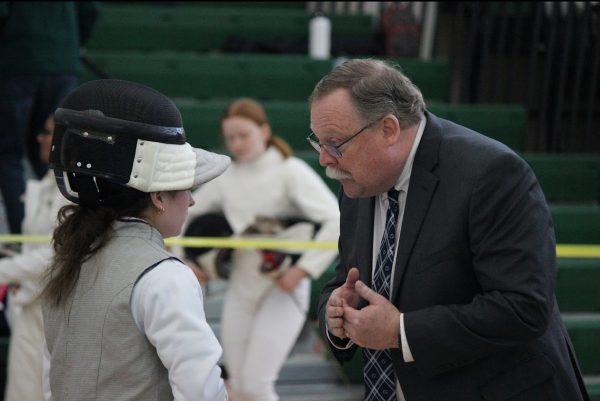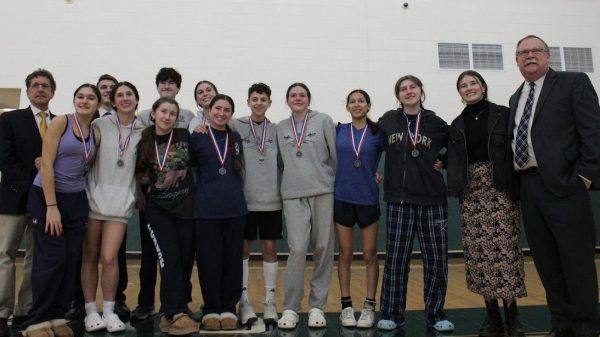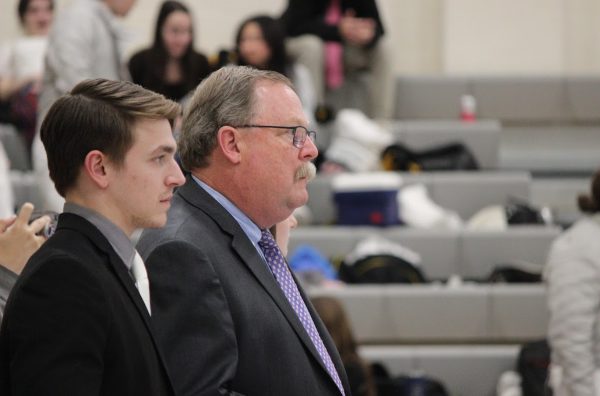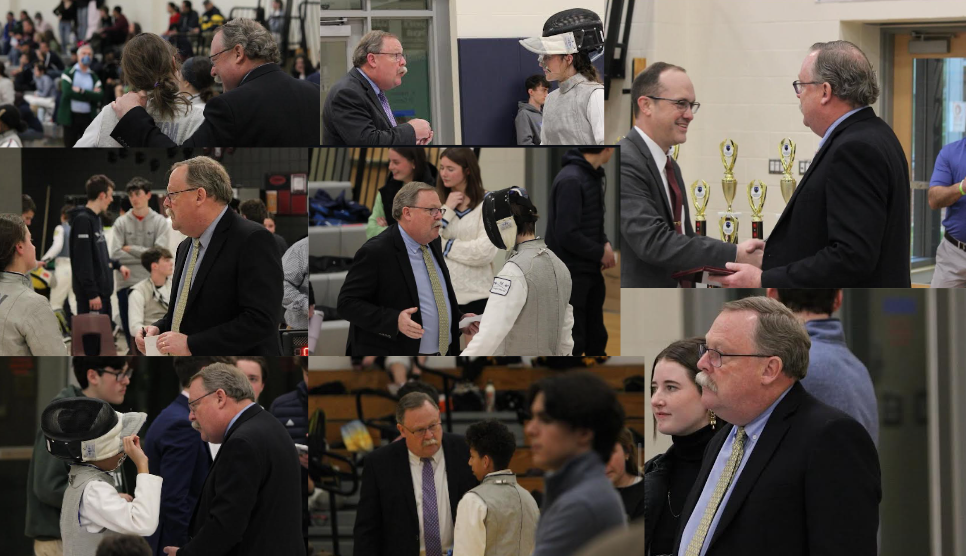When James Barnett’s oldest daughter was a senior in high school and applying to colleges, she had never made a resume, so they had to spend a crazy, late night trying to remember every club and activity she had done both in and outside of her last four years in school. When he started coaching the Morgan Fencing team, Barnett decided he would have all of his new fencers write and submit a resume to him, and update and resubmit it every year at the beginning of the season. In turn, he would write a recommendation for them anytime they needed. Senior Joseph O’Brien, one of the captains of the Morgan Fencing team, says that in his past four years on the team, Coach Barnett has taught him how to be a good leader and how to truly commit himself to things, especially now as captain.
Barnett has been the head coach of the Morgan Fencing team for 14 years. When his son, Stephen Barnett, was a freshman at Morgan, he made a proposal to the school administration for a fencing team, mentioning he already had a head coach, his father.
To become a team at Morgan, all sports must be accepted as a club first to ensure it will be a success. Fencing was a club for the first couple of years, but the team quickly grew to become one of the largest teams in the school, typically having 40-50 student-athletes

The Morgan Fencing team is very serious and dedicated. They dress up for school every match day, as well as dressing nice for the matches they are spectators at. The reasoning behind this is to form a sense of pride in your team and a respect for the sport. “We try to instill a sense of respect for your coaches, teammates, opponents, opposing coaches, and officials.” says Barnett.
Barnett attended Guilford High School, where he originally planned on joining the wrestling team, however, a back injury prevented him from attending tryouts, and a friend convinced him to join fencing, Barnett said he would try it for a year and then decide what to do. He was very successful at Guilford and was recruited by several of the best college fencing programs in the US. He went to The Pennsylvania State University for his freshman year, and fenced on their team.
Being involved in fencing for so long has affected Barnett’s life in many ways. “I have been able to travel to some amazing places, met so many wonderful people, been able to compete on a national level, and have been able to coach so many incredible student-athletes.” As a member of a college fencing team, Barnett traveled around the country in

high school, college and after college. He began competing in regional and national tournaments in high school, and continued to do so after graduating. After his freshman year at Penn State, he left the team to train with his coach, and to try to make the national team.
Having the opportunity to learn how to fence in high school allowed him to travel all over the country, and even into Canada to compete. “Learning fencing in high school was an amazing experience for me.” Getting to see the student athletes be so dedicated to the sport, and work hard towards learning and being champions, is what inspires him to continue coaching.
Fencing has been around for decades, originally used for self-defense and combat, then becoming a sport towards the end of the 19th century. There are three weapons used in this sport, sabre (saber), foil, and épée (eh-pay), and each weapon is different in its own way. Foil and épée both use weapons with pointed tips that require a set amount of pressure to set off, and you can only hit with the tip of the blade. Sabre has a rounded tip, and you can hit with any part of the blade. Additionally, each weapon has a set target, épée can hit anywhere on the body, including your feet and your face, foil is your whole torso, essentially cutting off your arms, legs, and head and that is the target, and Sabre is the waist up, head included.
Barnett loves being able to see so many of his students be successful on the fencing strip, then go off and fence for incredible colleges. Now that two of his students are back as assistant coaches for the team, he has the chance to teach

them a whole new aspect of fencing. In December, the fencing team hosts an alumni match, where any Morgan Fencing alumni can come back and fence any current or past members of the team. Barnett enjoys holding these matches because it gives him the chance to catch up with his past students and hear all about what they’re doing now.
“I enjoy teaching a unique sport to people who are interested in learning something that they can do for the rest of their lives if they want,” said Barnett.
Senior Henry Tessman has known Coach Barnett since he was in kindergarten because his older brothers were also members of the Morgan Fencing team. Barnett has had a massive positive impact on not only Tessman’s fencing skills, but also his life. Growing up knowing Barnett, Tessman says he sees “Coach” as a role model, and Barnett has made him a better person through the years. Tessman wants people to know that Barnett is not as scary as he seems. He is a great person and loves helping people any way he can.
“All the coaches on the team try to teach more than fencing, and we hope the skills they learn on the team will help with anything they do in the future.”
Joseph O’Brien noted how involved Barnett is, always checking up on his fencers, both in and out of the fencing season. Junior Anthony Strunjo agreed with O’Brien, stating, “Coach Barnett has always been very supportive of everyone on the team.” Strunjo says Barnett has made a huge impact on his life in the time he has known him, and taught Strunjo many important things, most notably, the importance of trusting himself, and not getting discouraged by small mistakes.


